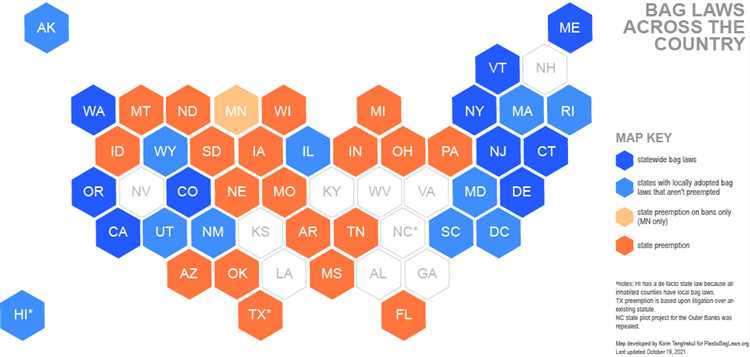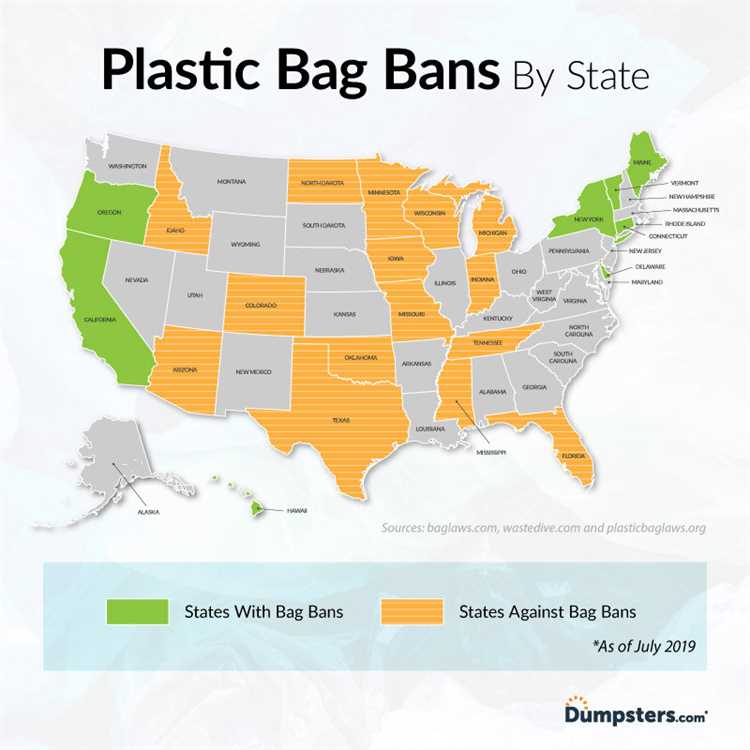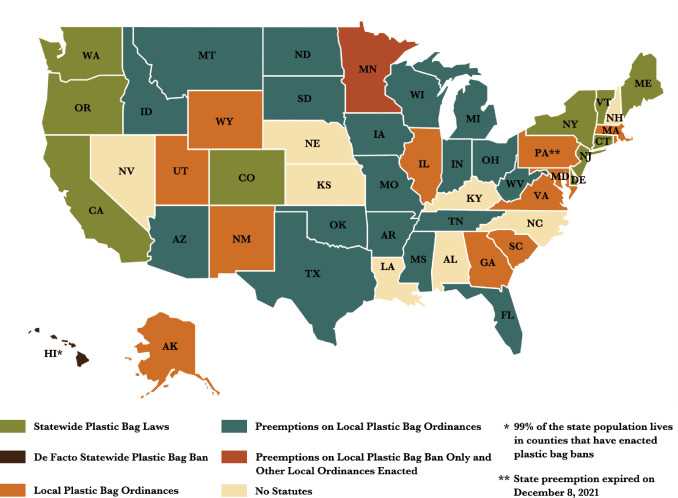
In recent years, the global movement to reduce the use of single-use plastic items has gained significant momentum. Plastic bags, in particular, have come under scrutiny due to their harmful impact on the environment. As a result, many states in the United States have taken action and implemented bans or restrictions on plastic bags.
One of the first states to enact a plastic bag ban was California. In 2014, California became the first state to ban single-use plastic bags at large retail stores. This ban was later expanded to include smaller stores as well. The goal of the ban was to encourage consumers to bring their own reusable bags and reduce plastic waste.
Following California’s lead, several other states have also implemented their own bans on plastic bags. Hawaii, for instance, has banned plastic bags at all retail locations since 2015. The ban in Hawaii includes both plastic bags and compostable bags. Other states that have implemented similar bans include New York, Oregon, and Maine.
While some states have implemented complete bans on plastic bags, others have opted for a different approach. Instead of outright banning plastic bags, some states have imposed fees or taxes on their use. For example, Washington, D.C. has implemented a 5-cent fee on all disposable bags, including plastic bags. This fee acts as a deterrent to encourage consumers to bring their own reusable bags.
Overall, the movement to reduce the use of plastic bags is gaining traction across the United States. As concerns about the environment continue to grow, more and more states are likely to adopt measures to limit the use of plastic bags in the future.
- States That Have Banned Plastic Bags
- California
- The Impact on Consumers
- The Future of Plastic Bag Regulations
- New York
- Benefits of the ban
- Enforcement of the ban
- Hawaii
- Effects of the ban
- Other sustainability efforts in Hawaii
- Oregon
- Vermont
- Connecticut
- Question-answer:
- Which states in the USA have banned plastic bags?
- Have any states in the USA banned plastic bags?
- What are some states in the USA that have banned plastic bags?
- Can you tell me which states have implemented a ban on plastic bags?
- Which states in the USA have prohibited the use of plastic bags?
- Which states in the USA have banned plastic bags?
- Why have these states banned plastic bags?
States That Have Banned Plastic Bags
In an effort to reduce plastic waste and promote environmental sustainability, several states in the United States have implemented bans on plastic bags. These bans aim to encourage the use of reusable bags and discourage the use of single-use plastic bags.
As of now, the following states have successfully implemented plastic bag bans:
California: California was the first state to implement a statewide ban on single-use plastic bags in 2016. The ban applies to most grocery stores and retail establishments.
Hawaii: Hawaii became the second state to ban single-use plastic bags, implementing the ban in 2015. The ban applies to all counties in the state.
New York: New York implemented a statewide ban on single-use plastic bags in March 2020. The ban applies to most retailers, with exceptions for certain types of bags.
Oregon: Oregon implemented a statewide ban on single-use plastic bags in January 2020. The ban applies to most retailers, with exceptions for certain types of bags.
Connecticut: Connecticut implemented a ban on single-use plastic bags in August 2021. The ban applies to most stores, with exceptions for certain types of bags.
Please note that the information provided is subject to change, and additional states may have implemented plastic bag bans since the time of writing.
California
California is a state that has been at the forefront of environmental initiatives, including the ban on plastic bags. In 2014, California became the first state in the United States to implement a statewide ban on single-use plastic bags in large retail stores. The ban was aimed at reducing the negative impacts of plastic bags on the environment, such as litter and harm to wildlife.
The ban was met with some resistance from plastic bag manufacturers and retailers, but it has been largely successful in achieving its goals. Since the ban went into effect, there has been a significant decrease in the number of plastic bags used and discarded in California. This has led to a cleaner environment, with less plastic pollution in landfills, waterways, and natural habitats.
California’s ban on plastic bags has also had positive economic impacts. It has created new opportunities for the production and use of reusable bags, which are more durable and environmentally friendly. This has helped to support local businesses and create jobs in the manufacturing and distribution of reusable bags.
The Impact on Consumers

The ban on plastic bags in California has required consumers to make some adjustments to their shopping habits. Instead of relying on single-use plastic bags, consumers are encouraged to bring their own reusable bags when shopping. Many retailers offer reusable bags for purchase, and some provide incentives, such as discounts or rewards, for bringing reusable bags.
While the transition to reusable bags may have initially been a challenge for some consumers, it has become increasingly normalized and accepted. Many Californians now see the ban as a positive step towards a more sustainable future.
The Future of Plastic Bag Regulations

California’s ban on single-use plastic bags has set an example for other states and countries around the world. It has demonstrated that it is possible to reduce plastic waste and promote more sustainable alternatives. As a result, several other states in the United States have followed California’s lead and implemented similar bans on plastic bags.
However, there is still work to be done. While the ban in California has significantly reduced the use of plastic bags, there are still other sources of plastic waste that need to be addressed. Many environmental organizations are advocating for further regulations and policies to address these issues and promote more sustainable practices.
In conclusion, California’s ban on plastic bags has been a pioneering effort in reducing plastic waste and promoting sustainable alternatives. It has had positive environmental and economic impacts and has set an example for other states and countries to follow. The ban represents a significant step towards a more sustainable future and a cleaner environment for all.
New York
New York is one of the states in the United States that has implemented a ban on plastic bags. The ban was first proposed in 2019 and officially went into effect on March 1, 2020. The goal of the ban is to reduce the amount of plastic waste in the state and encourage the use of reusable bags.
Under the ban, most grocery stores, pharmacies, and other retail establishments are no longer allowed to provide single-use plastic bags to customers. Instead, customers are encouraged to bring their own reusable bags or opt for paper bags, which are still available but may come with a small fee.
Benefits of the ban
The ban on plastic bags in New York has several benefits. First and foremost, it helps to reduce the amount of plastic waste that ends up in landfills and pollutes the environment. Plastic bags are not easily biodegradable and can take hundreds of years to break down.
By encouraging the use of reusable bags, the ban also reduces the demand for plastic production. Plastic production requires the use of fossil fuels and contributes to greenhouse gas emissions and climate change.
Enforcement of the ban
The ban on plastic bags in New York is enforced by the New York State Department of Environmental Conservation. Retail establishments that fail to comply with the ban may be subject to fines and penalties.
| Paper Bags | Reusable Bags |
|---|---|
| While plastic bags are no longer allowed, paper bags are still an option for consumers. However, retail establishments are allowed to charge a small fee for paper bags. | Reusable bags are the preferred alternative to single-use plastic bags. They are durable, long-lasting, and can be used for multiple shopping trips. |
Hawaii
Hawaii has banned plastic bags statewide. The ban went into effect on July 1, 2015, making Hawaii the first state in the United States to implement such a ban. The ban applies to all retailers, including grocery stores, convenience stores, and other businesses that provide bags to customers.
Effects of the ban
Since the ban was implemented, residents and visitors in Hawaii have had to adjust to using alternative bags, such as reusable bags, paper bags, or biodegradable bags. The goal of the ban is to reduce plastic waste and protect the environment, specifically the marine life and natural habitats that can be negatively impacted by plastic pollution.
While the ban has been successful in reducing plastic bag usage, it has faced some challenges and controversy. Some residents argue that the ban has led to an increase in the use of paper bags, which also have negative environmental impacts. Others believe that the ban should have included more types of businesses or implemented additional measures to encourage the use of reusable bags.
Other sustainability efforts in Hawaii
In addition to the plastic bag ban, Hawaii has taken other steps to promote sustainability and reduce waste. The state has implemented a bottle deposit program, where consumers can receive a refund for returning bottles and cans. This has encouraged recycling and reduced litter.
Hawaii is also working towards a goal of using 100% renewable energy by 2045. The state has abundant natural resources, such as solar and wind power, which it is harnessing to reduce its dependence on fossil fuels. This commitment to renewable energy aligns with Hawaii’s efforts to protect the environment and promote sustainability.
Hawaii’s ban on plastic bags is just one example of the state’s dedication to preserving its natural beauty and protecting the planet. By encouraging the use of alternative bags and implementing other sustainability measures, Hawaii is leading the way in creating a more eco-friendly future.
Oregon
Oregon is one of the states that has taken action to reduce plastic bag waste. The state first enacted a plastic bag ban in 2019. The ban prohibits retail stores and restaurants from providing single-use plastic bags to customers.
Under the ban, retailers are required to offer reusable bags, recycled paper bags, or compostable bags as alternatives to plastic bags. Shoppers in Oregon are encouraged to bring their own reusable bags when they go shopping to further reduce plastic waste.
The ban applies to most retailers, including grocery stores, convenience stores, and pharmacies. However, there are some exceptions, including bags for produce, meat, and bulk items, as well as bags for prescription drugs.
The plastic bag ban in Oregon is part of a larger effort to reduce plastic pollution and promote sustainable practices. By eliminating single-use plastic bags, the state hopes to encourage consumers to adopt more eco-friendly habits and reduce the amount of plastic that ends up in landfills and the environment.
Vermont
Vermont is one of the states that has taken action to reduce the use of plastic bags. In 2012, the state passed a law that bans the use of single-use plastic bags at all retail establishments. This includes grocery stores, convenience stores, and other retailers.
The ban on plastic bags in Vermont aims to reduce pollution and protect the environment. Disposable plastic bags are a major source of litter and can take hundreds of years to break down. By banning these bags, Vermont hopes to encourage residents to use reusable bags instead.
The ban on single-use plastic bags in Vermont is part of a broader effort to reduce waste and promote sustainability. The state has also implemented other initiatives, such as a bottle deposit program and a ban on Styrofoam containers.
Vermont’s ban on plastic bags has been successful in significantly reducing the use of these bags. The state has seen a decrease in litter and waste, and residents have adapted to using reusable bags. The ban has also sparked conversations about the impact of plastic on the environment and has increased awareness about the need for sustainable solutions.
Overall, Vermont’s ban on plastic bags is a step in the right direction towards a cleaner and more sustainable future.
Connecticut
Connecticut is one of the states that has taken action to reduce the use of plastic bags. In 2019, the state passed a law that prohibits retailers from providing single-use plastic bags to customers at the point of sale.
Under the new law, retailers are required to charge a fee for each paper bag provided to customers. This fee is intended to encourage individuals to bring their own reusable bags when they go shopping.
In addition to the ban on plastic bags, Connecticut has also implemented other measures to reduce plastic waste. The state has a bottle deposit program that encourages the recycling of plastic and glass bottles, as well as a ban on single-use plastic straws and stirrers.
Connecticut’s efforts to reduce plastic bag usage align with the broader movement across the United States to address the environmental impact of single-use plastics. By implementing these measures, the state is working toward a more sustainable future.
Question-answer:
Which states in the USA have banned plastic bags?
Several states in the USA have banned plastic bags. These include California, New York, Hawaii, Maine, and Vermont.
Have any states in the USA banned plastic bags?
Yes, several states in the USA have banned plastic bags. These include California, New York, Hawaii, Maine, and Vermont.
What are some states in the USA that have banned plastic bags?
California, New York, Hawaii, Maine, and Vermont are among the states in the USA that have banned plastic bags.
Can you tell me which states have implemented a ban on plastic bags?
Certain states in the USA have implemented a ban on plastic bags. These states include California, New York, Hawaii, Maine, and Vermont.
Which states in the USA have prohibited the use of plastic bags?
The use of plastic bags has been prohibited in several states in the USA, including California, New York, Hawaii, Maine, and Vermont.
Which states in the USA have banned plastic bags?
As of now, there are 9 states in the USA that have banned plastic bags. These states include California, Connecticut, Delaware, Hawaii, Maine, New York, Oregon, Vermont, and Washington. Each state may have different regulations and exemptions when it comes to the ban.
Why have these states banned plastic bags?
These states have banned plastic bags due to environmental concerns. Plastic bags are known to have a negative impact on the environment, taking hundreds of years to decompose and often ending up in landfills or polluting the oceans. The ban on plastic bags aims to reduce plastic waste, promote reusable alternatives, and protect wildlife and ecosystems from further harm.